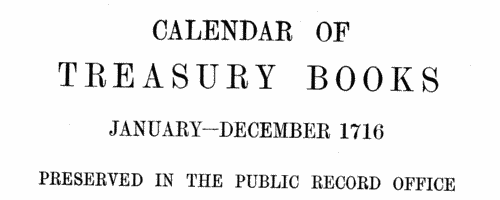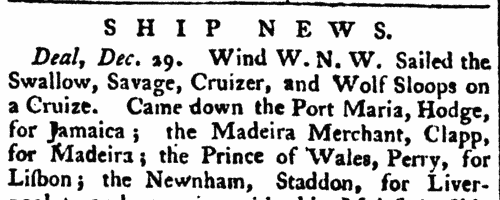Add this eBook to your basket to receive access to all 195 records. Our indexes include entries for the spelling hastie. In the period you have requested, we have the following 195 records (displaying 1 to 10): These sample scans are from the original record. You will get scans of the full pages or articles where the surname you searched for has been found. Your web browser may prevent the sample windows from opening; in this case please change your browser settings to allow pop-up windows from this site. Scottish litigants, rebels and cautioners
(1610-1613)
The Privy Council of Scotland exercised a superior judicial authority in the kingdom, and consequently received and dealt with a constant stream of petitions, as well as dealing with the internal security of the state. This register of the council from July 1610 to February 1613, in the reign of king James VI, was edited by David Masson and published under the direction of the Deputy Clerk Register of Scotland in 1889. The publication starts with the Acta and Decreta, a chronological consolidation of material from Acta Secreti Concilii proper, the Decreta, the Book of Commissions, the Book of Sederunts, the Minute Book of Processes, and The Book of the Isles. There is then a section of Royal and Other Letters (pp. 565-644); then acts and bands (bonds) of caution (surety) from the registers called Acta Cautionis (pp. 647-690); and Miscellaneous Privy Council Papers (693-746). Many of the individuals mentioned are the complainants, those of whom they complained, and the sureties on both sides: at this period, many of the complainants are alleging serious attacks, often of a feuding nature. Many of the bonds entered into by the cautioners are promises to keep the peace towards such enemies. Failure to answer to the council when summoned was a serious contempt, leading to being denounced a rebel, with serious consequences.
| Sample scan, click to enlarge

| Official Papers
(1691-1692)
The State Papers Domestic cover all manner of business relating to Britain, Ireland and the colonies, conducted in the office of the Secretary of State as well as other miscellaneous records. Includes lists of passes to travel abroad.
| Sample scan, click to enlarge

| Ordnance Accounts
(1715-1716)
Abstract of the Treasury declared accounts for the Ordnance, 30 June 1715 to 30 June 1716: AO 1/1865/127. Includes the names of officers of the train of artillery, and the field train in North Britain; of merchants dealing in emptions, provisions, and surplus stores; and of those engaged on repairs to castles and fortresses. | Sample scan, click to enlarge

|  Apprentices registered in Scotland
(1728-1731) Apprentices registered in Scotland
(1728-1731)
Apprenticeship indentures and clerks' articles were subject to a 6d or 12d per pound stamp duty: the registers of the payments usually give the master's trade, address, and occupation, and the apprentice's father's name and address, as well as details of the date and length of the apprenticeship. There are central registers for collections of the stamp duty in London, as well as returns from collectors in the provinces and from Scotland. The sums collected are recorded in Scottish money, with conversion to sterling for transfer to London. A Scottish pund was worth 20 English pence. (The sample entry shown on this scan is taken from a Norfolk return) | Sample scan, click to enlarge

|  Apprentices registered in Scotland
(1750-1754) Apprentices registered in Scotland
(1750-1754)
Apprenticeship indentures and clerks' articles were subject to a 6d or 12d per pound stamp duty: the registers of the payments usually give the master's trade, address, and occupation, and the apprentice's father's name and address, as well as details of the date and length of the apprenticeship. There are central registers for collections of the stamp duty in London, as well as returns from collectors in the provinces and from Scotland. (The sample entry shown on this scan is taken from a Norfolk return) | Sample scan, click to enlarge

|  Masters of Apprentices registered in Scotland
(1750-1754) Masters of Apprentices registered in Scotland
(1750-1754)
Apprenticeship indentures and clerks' articles were subject to a 6d or 12d per pound stamp duty: the registers of the payments usually give the master's trade, address, and occupation, and the apprentice's father's name and address, as well as details of the date and length of the apprenticeship. There are central registers for collections of the stamp duty in London, as well as returns from collectors in the provinces and in Scotland. (The sample entry shown on this scan is taken from a Norfolk return) | Sample scan, click to enlarge

| Masters of Merchantmen
(1757)
The movements of British and foreign ships in Britain and abroad are recorded as Ship News in the London newspapers: these are the entries from January to June 1757. | Sample scan, click to enlarge

|  Masters of apprentices registered in Scotland
(1766) Masters of apprentices registered in Scotland
(1766)
Apprenticeship indentures and clerks' articles were subject to a 6d or 12d per pound stamp duty: the registers of the payments usually give the master's trade, address, and occupation, and the apprentice's name, as well as details of the date and length of the apprenticeship. There are central registers for collections of the stamp duty in London, as well as returns from collectors in the provinces. These collectors generally received duty just from their own county, but sometimes from further afield. The indentures themselves can date from a year or two earlier than this return. (The sample entry shown on this scan is taken from a Durham return. Each entry has two scans, the other being the facing page with the details of the indenture, length of service, and payment of duty.) IR 1/55 | Sample scan, click to enlarge

|  Masters of apprentices registered in Scotland
(1771) Masters of apprentices registered in Scotland
(1771)
Apprenticeship indentures and clerks' articles were subject to a 6d or 12d per pound stamp duty: the registers of the payments usually give the master's trade, address, and occupation, and the apprentice's name, as well as details of the date and length of the apprenticeship. There are central registers for collections of the stamp duty in London, as well as returns from collectors in the provinces. These collectors generally received duty just from their own county, but sometimes from further afield. The indentures themselves can date from a year or two earlier than this return. (The sample entry shown on this scan is taken from a Durham return. Each entry has two scans, the other being the facing page with the details of the indenture, length of service, and payment of duty.) IR 1/57 | Sample scan, click to enlarge

| Masters of Merchantmen
(1785)
The Daily Universal Register of January 1785 includes a section entitled Ship News. This is compiled from reports from Portsmouth, Deal, Poole and Gravesend as to merchant shipping movements; news of losses and sightings coming in from various ports; a list of Ships Arrived in the (London) River, in the Clyde, in the Downs, in the Humber, in Bantry Bay, off Beachy Head, off Beer Haven, off Cape Clear, off Cape Fear, off Hastings, off Hilston, off Portland, off Porto Bar, off Scilly, at Alicante, Ancona, Antigua, Baltimore, Barbadoes, Belfast, Bilbao, Bonny, Bordeaux, Boulogne, Bremen, Brighthelmstone (Brighton), Bristol, Cadiz, Cape Breton, Cartagena, Charlestown, Chester, Constantinople, Cork, Corunna, Cowes, Creek, Crookhaven, Dantzig, Dartmouth, Dominica, Dover, Dublin, Exeter, Falmouth, Faro, Figuera, Genoa, Gibraltar, Gottenburg, Greenock, Grenada, Halifax (Nova Scotia), Havannah, Hoylake, Hull, Jersey, Killybegs, Lancaster, Leghorn, Leith, Limerick, Lisbon, Liverpool, Londonderry, L'Orient, Lowestoft, Madeira, Madras, Milford, Minorca, Mogador, Naples, New Calabar, New Providence (Bahamas), New York, Newry, Nice, Old Calabar, Oporto, Ostend, Peel, Penzance, Philadelphia, Piscatequa, Plymouth, Pondicherry, Port Roseway, Porto, Portsmouth, Rochelle, Ross, Rotterdam, St Kitts, St Lucia, St Michael, St Vincents, Savannah, Scarborough, Southampton, Tenerife, Texel, Tobago, Torbay, Vigo, Waterford, Whitehaven, and in 'Africa', Angola, Grenadoes, Honduras, the Isle of Wight, Jamaica, Maryland, New England, Newfoundland, Philadelphia and Virginia; and Reports of Ships made at the Custom House in London. Except in the home ports, the register refers only to British shipping: each ship is usually identified merely by its name, and the master's surname, although masters' christian names are given occasionally. Naval vessels are mentioned rarely, and their captains' names not usually stated. | Sample scan, click to enlarge

|
Research your ancestry, family history, genealogy and one-name study by direct access to original records and archives indexed by surname.
|












